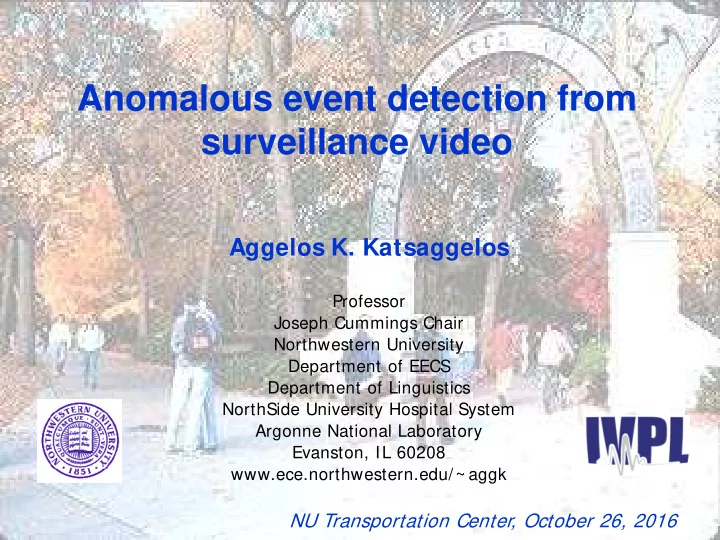

Anomalous event detection from surveillance video Aggelos K. Katsaggelos Professor Joseph Cummings Chair Northwestern University Department of EECS Department of Linguistics NorthSide University Hospital System Argonne National Laboratory Evanston, IL 60208 www.ece.northwestern.edu/~ aggk NU Transportation Center, October 26, 2016
Introduction • Wide-scale deployment of surveillance systems • Installation and infrastructure costs are largest barrier to deployment of ubiquitous traffic surveillance • Major system cost contributors are: – network requirements (bandwidth) – hardware requirements (processing power and memory) – system intelligence
Anomalies in Surveillance Video – Intelligent surveillance system • Video scene understanding, alarm abnormal behavior • Limitation of human observation – Research problems • Object detection & classification • Motion tracking & modeling • Behavior analysis
Anomaly Detection • What are anomalies in data? • Type of anomaly • Point anomaly • Contextual anomaly • No data label Point anomaly • Clustering-based approach • Data mining approach Contextual anomaly
Background Subtraction Background Foreground Low-rank matrix Sparse matrix
Object Detection and Tracking
Traffic Video Data
Localized Video Surveillance Video Capture Analysis Storage Control Feedback • Localized systems acquire, process, and store video locally. • The requirements for these processes make each node costly and difficult to position.
Centrally Controlled Video Surveillance Control Feedback Analysis Storage Video Capture Channel Compression Decompression Compressed Video Remote Node Central Node • Centrally controlled – simple, low cost remote nodes – Compress then send – more capable central node . • However, they entail – high infrastructure costs ( bandwidth ) – loss in quality due to bandwidth limitations
Tracking Objects in Compressed Video • Compression introduces artifacts – Flicker (motion compensation) – Synthetic edges (block based transform) – Smoothing (low freq. quantization) – Mosquito noise (high freq. quantization) • Artifacts get worse with lower bitrate • Some artifacts impact trackers more severely than others
Incorporating Spatiotemporal Context • 4 categories of anomaly – Point Anomaly : anomalous event of single object at specific time instance – Sequential Anomaly : anomalous event of single object during a time range – Co-occurrence Anomaly : anomalous event of multiple objects at specific time instance – Interaction Anomaly : anomalous event of multiple objects during a time range • F. Jiang, J. Yuan, S. Tsaftaris ,and A. K. Katsaggelos, “Video anomaly detection in spatiotemporal context,” IEEE Int'l Conf. on Image Process ., Hong Kong, Sept 2010. • F. Jiang, J. Yuan, S. A. Tsaftaris, and A. K. Katsaggelos, “Anomalous video event detection using spatiotemporal context,” Computer Vision and Image Understanding , 2011.
Study Case • Surveillance video : traffic at road intersection Traffic controlled by traffic lights • • Traffic lights information unknown • Task : • Discover motion patterns followed by most vehicles • Detect anomalous traffic motion
Point Anomaly Detection • Atomic event e a (i,t) – Single object i, time t – Location (lane #) – Direction (N/S/W/E) – Velocity (move/stop) • Computing 3-D histogram of all e a (i,t) – Normal patterns (frequent events) : high bins – Point anomalies (rare events) : low bins
Results • Normal pattern • Point anomaly
Sequential Anomaly Detection • Sequential event e s (i) • Single object i, complete duration time • A sequence of atomic events : • ( e a (i,1), e a (i,2), e a (i,4), … ) • Frequent subsequence mining Detect 44 normal patterns • • Classify every e s (i) to closest normal pattern • Edit distance • Detect parts different to normal pattern as sequential anomaly
Results • Normal pattern • Sequential anomaly
Co-occurrence Anomaly Detection • Co-occurrence event e c (t) • Multiple objects, time t • An itemset of sequential events { e s (i) | all i appearing at t } • Frequent Itemset Mining • Detect 5 normal patterns • Regard as 5 traffic states • Model state transition by HMM • Classify every e c (t) by HMM decoding • Detect parts different to normal pattern as sequential anomaly
Results • Normal pattern • Co-occurence anomaly
System Performance
Pedestrian Examples • Walking Scenario • Point anomaly
Pedestrian Examples • Sequential Anomaly
A Different Approach • The goal is to understand activities and interactions in a complicated scene, e.g., a crowded traffic scene. • Find typical single-agent activities (e.g., car makes a U- turn) and multi-agent interactions (e.g., vehicles stop waiting for pedestrians to cross the street) in this scene; • Label short video clips in a long sequence by interaction, and localize different activities involved in an interaction; • Show abnormal activities, e.g., pedestrians crossing the road outside the crosswalk; and abnormal interactions, e.g., jay-walking (people cross the road while vehicles pass by) Support queries about an interaction that has not yet • been discovered by the system. L. Song, F. Ziang, Z. Shi, R. Molina, and A. K. Katsaggelos, "Dynamic scene understanding by hierarchical motion pattern mining", IEEE Transactions on Intelligent Transportation Systems , vol. 15, issue 3, June 2014.
Bayesian Hierarchical Models • Compute low-level visual features – Local motion (moving pixels indexed by location and direction) • Word-document analysis – Quantizing local motion into visual words and dividing the long video sequence into short clips as documents • Hierarchical Bayesian model – Atomic activities are modeled as distributions over low- level visual features – Interactions are modeled as distributions over atomic activities
Discover Atomic Activities • 29 atomic activities (4 colors: 4 motion directions)
Discover Interactions • 5 different interactions • First row: the interaction distributions over 29 atomic activities • Second row: a video clip as an example for each interaction (the motions of the 5 largest atomic activities marked)
Abnormality Detection • Under the Bayesian models, abnormality detection is based on the marginal likelihood of every video clip or motion Example1: Example2: Pedestrian crossing the street Pedestrian crossing the street while vehicle is passing while the red light is on
Segmentation
Closing Thoughts • Transportation problems rich in applying ML • Developed techniques applicable to other areas • It is only the beginning
Recommend
More recommend